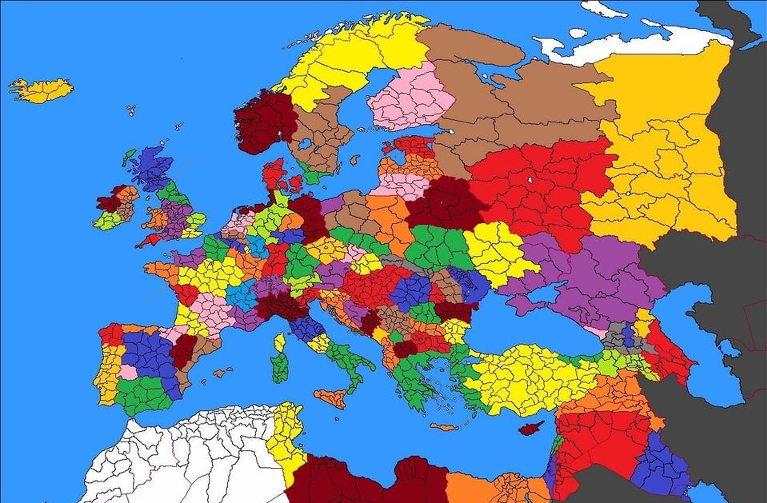If we want to create healthy economies that protect rather than destroy local ecosystems, we will need to rewrite international trade rules in ways that include the social and ecological costs of production and consumptions, as well as trade. We need to protect local economies from ‘cheap’ imports made possible by hidden subsidies, externalising true costs, and outsourcing production (exploiting international inequality).
Re-localising and re-regionalising economics — while maintaining international collaboration and fair trade — creates jobs and community resilience. Re-localisation can support an economics of care — for people and place — that synergistically leads to positive social and ecological impact.
Activist, author and educator Daniel Christian Wahl speaks with Helena Norberg-Hodge (Director of Local Futures) about the multi-layered consequences of the pandemic on society. Daniel explains that to lessen the human impact on our planet, we need to decentralize the power of governments, and change our economic and monetary systems. He also emphasizes the importance of diversity in ensuring environmental stability. (Recorded on World Localization Day 2020, see more recordings from the day)
Neoclassical economic dogma would call this ‘protectionism’ and oppose it because ‘we need deregulation instead of regulation to ensure the free-market’. What a pervasive myth this so-called “free-market” is proving to be! In a conditioned knee-jerk response, many intelligent people will defend an ideal — the free market — that simply does not exist and never has.
“The world is suffering from the perverse incentives of ‘unnatural capitalism’. When people say ‘free market’, I asked if free is a verb. We don’t have a free market, but a highly managed and often monopolized market. […] we have banks and companies that are ‘too big to fail’, but in truth are too big not to fail. The resulting extremes of concentration of wealth and political power are very bad for business and the economy (not to mention the environment, human rights, and democracy). One result is that small companies can’t advance too far against the big players with their legions of lawyers and Capitol Hill lobbyists, when in truth it’s small and medium-sized companies that provide the majority of jobs as well as innovation.”— Kenny Ausubel (in Jay Harman, 2013:77)
Every time we speak about re-localisation and re-regionalisation it is important to emphasise that this path is not about simply creating the conditions that our bioregion can weather the storms of the next three decades of climate change and the many converging crises.
There will be no ‘life boats’ on a planet in run-away climate change. The only way we can heal the planetary system is if we enable people in bioregions everywhere to uniquely express the potential of each place that they live in while engaging in ecosystems restoration at the landscape scale. The resulting carbon drawdown along with many other social and technological changes (see Hawken, 2017) will over the long run lead to the re-stabilisation of climate patterns, an increase in the planets primary productivity, and the regeneration of planetary health.
Over 90% of our species’ history is based on bioregional patterns of inhabiting the Earth in close reciprocity with the opportunities and challenges of particular ecosystems. Even today, indigenous cultures around the world still follow this living pattern. Whether during the many millennia of our Nomadic existence or among the early settled cultures, our patterns of living where closely matched to the uniqueness of the places and regions we inhabited. It is at the local and bioregional scales that we can transform our impact.
Often the most critically important question regarding the ‘circular economy’ is not asked clearly enough: At which spatial and temporal scales are we cycling what using which renewable energy source? As we will have to stop drilling for oil and mining for coal or minerals to avoid cataclysmic climate change, there are great opportunities for innovation that will help us to create place-specific bioregionally focussed circular biomaterials economies. Re-envisioning and re-designing the metabolism of cities within the context of the bio-productivity of their local bioregions will be part of the transition towards diverse regenerative economies.
With more than half of humanity living in urban areas the creation of bioregionally regenerative cities (Girardet, 2014) will be a critical contribution to the redesign of the human impact on Earth from being exploitative and degenerative to being regenerative and healing! Each city-bioregion has the potential of becoming a unique thriving regenerative economy.
The work of Kate Raworth’s Doughnut Economics Action Lab (DEAL) with the city of Amsterdam is just the beginning of cities exploring how they can thrive while making the regional economies and ecosystems that surround them thrive.
Thriving economies will be based on an economics of belonging to place and culture — elegant expressions of the uniqueness of people and place manifesting their potential for co-evolving mutuality. The bioregionally reinhabitory economies of the near future are about coming home!
“Those who envision a possible future planet on which we continue […], and where we live by the green and the sun, have no choice but to bring whatever science, imagination, strength, and political finesse they have to the support of the inhabitory people — natives and peasants of the world. In making common cause with them, we become ‘reinhabitory’.”— Gary Snyder, 1976





